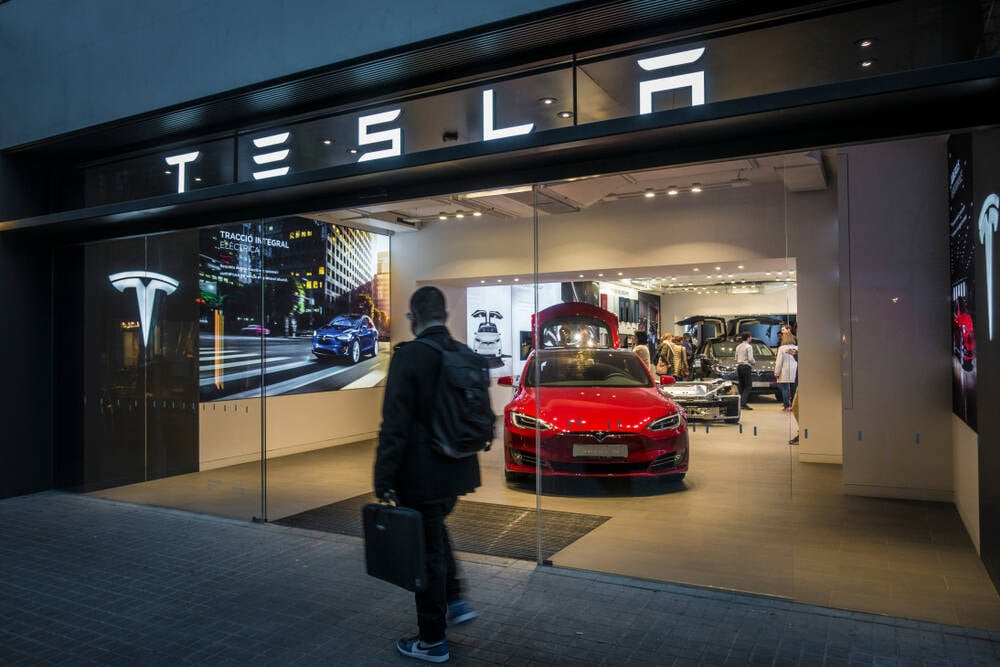Dual Tesla Lawsuits Pull Elon Musk Into Right-to-repair War

Tesla is facing a fresh pair of proposed class action lawsuits, and not due to vehicle safety: this time it's all about the rights, or lack thereof, that Tesla owners have to repair their vehicles on their own terms.
The dual cases, filed Tuesday [PDF] and Wednesday [PDF] of this week, both allege that Tesla is guilty of violating antitrust laws by essentially forcing consumers to come directly to it for service and parts.
The Musk-owned automaker's actions, lawyers in the suits argue, "has caused Tesla owners to suffer lengthy delays in repairing or maintaining their EVs, only to pay supracompetitive prices for those parts and repairs once they are finally provided."
If those allegations turn out to be true, Tesla will have to face four counts of violating section 2 of the Sherman Antitrust Act, which prohibits monopolizing interstate commerce, with allegations that Tesla both attempted to monopolize, and successfully monopolized, the Tesla-compatible parts and repair market in every state it operates.
Tesla is also being accused of violating section 1 of the Sherman Act by unlawfully tying repairs and parts to the purchase of a Tesla EV by prohibiting vehicle owners from going to third-party repair shops or seeking aftermarket parts.
The final allegation in the case is that the company violated the Magnuson-Moss Warranty Act's provision on warranty tying, which the plaintiffs allege Tesla did by forcing vehicle owners to seek service at branded Tesla locations that only offer OEM components.
"Tesla needs to open up its ecosystem and allow competition for the servicing of Tesla [vehicles] and sales of parts," plaintiff lawyer Matthew Ruan told Reuters.
While the cases don't specify the monetary payout desired for the plaintiffs, they do propose a class of any Tesla owner who paid for Tesla repair service or Tesla-compatible parts between March 2019 and the present day. In other words, this could get costly for Tesla if forced to cover all those repairs costs.
Another front in the right to repair war
The charges in these cases are all about antitrust violations, but the relief being requested definitely makes these cases about right to repair, with both asking that Tesla be required "to provide access to manuals, diagnostic tools, and vehicle telematic data, at a reasonable cost, to individuals and independent repair shops."
According to the lawsuits, Tesla previously made manuals available online, but at the cost of a $3,187 yearly subscription. In May of last year Tesla made its manuals available for free online, the suits claim, but access to diagnostic software required to troubleshoot vehicles was still behind a $3k paywall.
"By designing its EVs such that repairs require access to remote diagnostics and over-the-air software updates, Tesla effectively limits anyone other than Tesla from being able to provide maintenance and repair services for its EVs," the suits allege.
- Here's a fun idea: Try to unlock and drive away in someone else's Tesla
- Musk said Twitter would open source its algorithm – then fired the people who could
- British industry calls for regulation of autonomous vehicles
- US officials probe Tesla's incredible detaching steering wheel
With both lawsuits making the same allegations and levying the same charges in the same federal court district it's likely they'll be combined into a single proceeding, as was the case when John Deere was hit with several suits alleging it monopolized repairs and access to parts.
While the Tesla and John Deere cases are ongoing, a lawsuit that accused motorcycle maker Harley-Davidson of similar monopolization of parts and service wound down last year with Harley being forced to add language to its warranties allowing the use of third-party parts and service.
We asked Tesla for comment on the case, and while it appears the company's press mailbox is no longer rejecting messages due to being full, we didn't get a response at the time of publication. ®
From Chip War To Cloud War: The Next Frontier In Global Tech Competition
The global chip war, characterized by intense competition among nations and corporations for supremacy in semiconductor ... Read more
The High Stakes Of Tech Regulation: Security Risks And Market Dynamics
The influence of tech giants in the global economy continues to grow, raising crucial questions about how to balance sec... Read more
The Tyranny Of Instagram Interiors: Why It's Time To Break Free From Algorithm-Driven Aesthetics
Instagram has become a dominant force in shaping interior design trends, offering a seemingly endless stream of inspirat... Read more
The Data Crunch In AI: Strategies For Sustainability
Exploring solutions to the imminent exhaustion of internet data for AI training.As the artificial intelligence (AI) indu... Read more
Google Abandons Four-Year Effort To Remove Cookies From Chrome Browser
After four years of dedicated effort, Google has decided to abandon its plan to remove third-party cookies from its Chro... Read more
LinkedIn Embraces AI And Gamification To Drive User Engagement And Revenue
In an effort to tackle slowing revenue growth and enhance user engagement, LinkedIn is turning to artificial intelligenc... Read more

